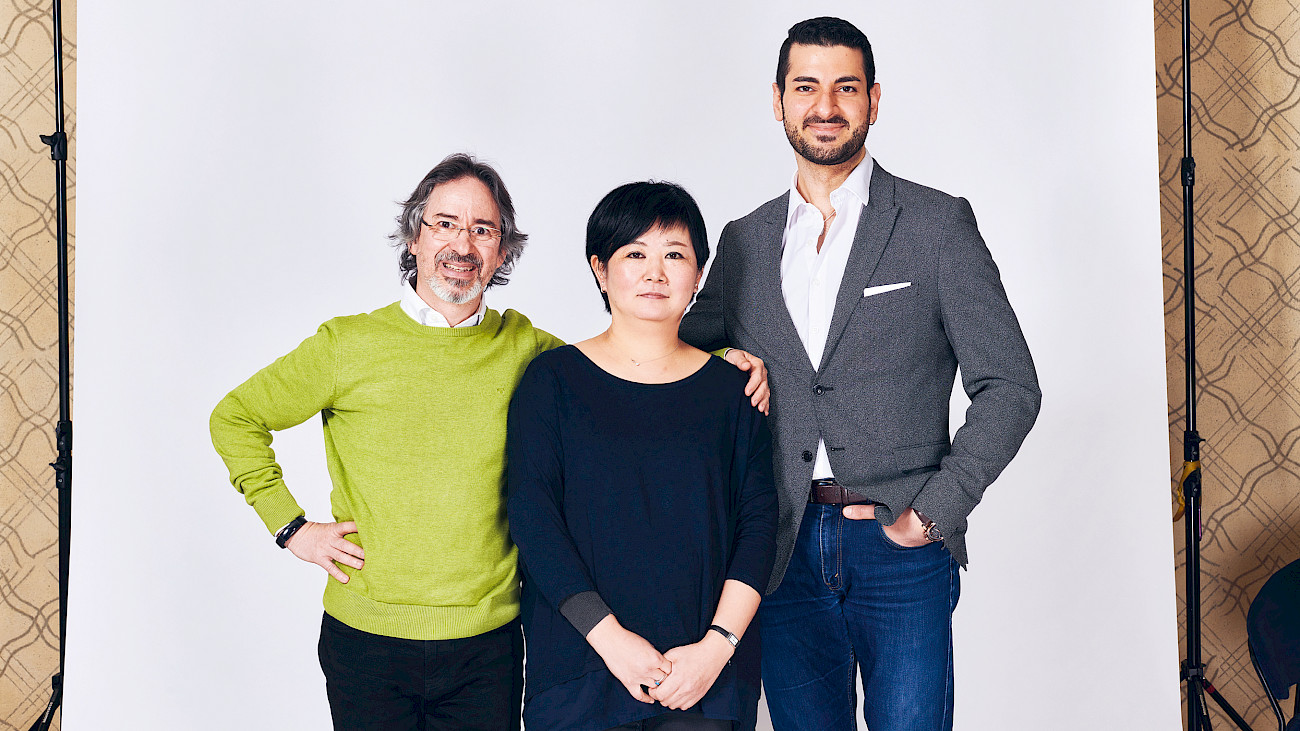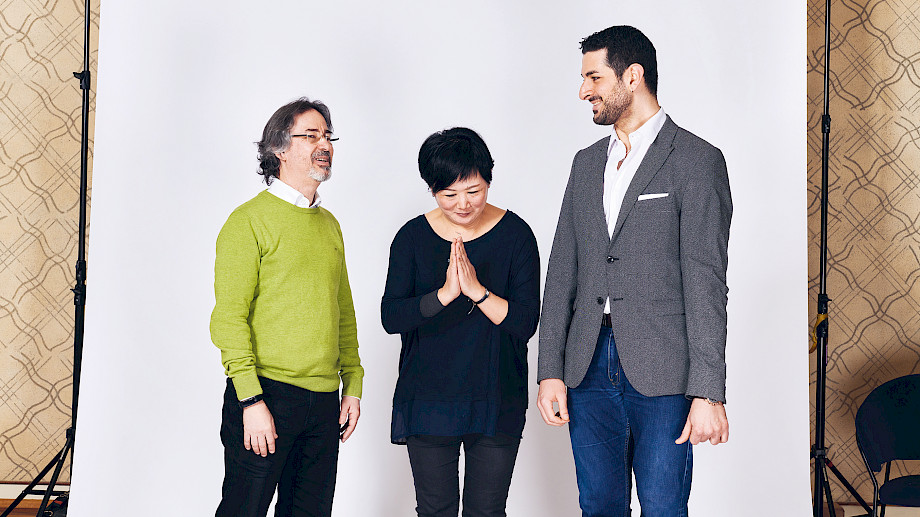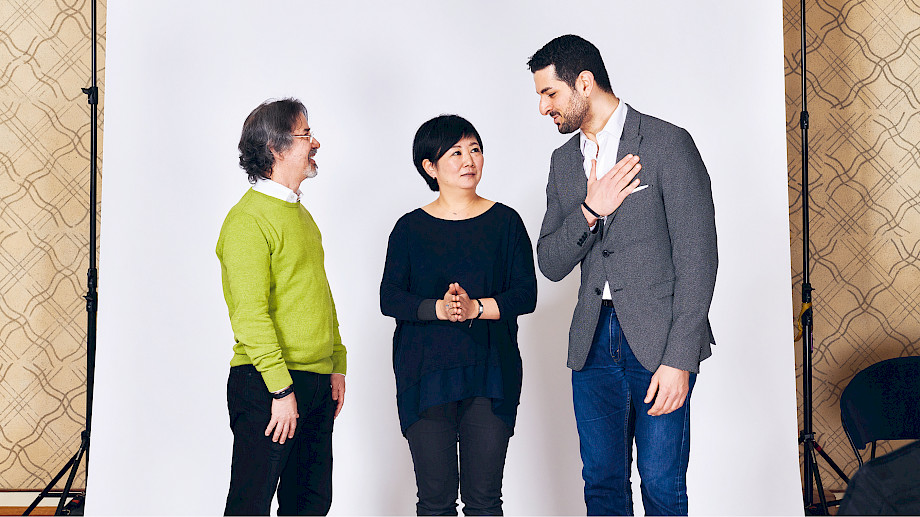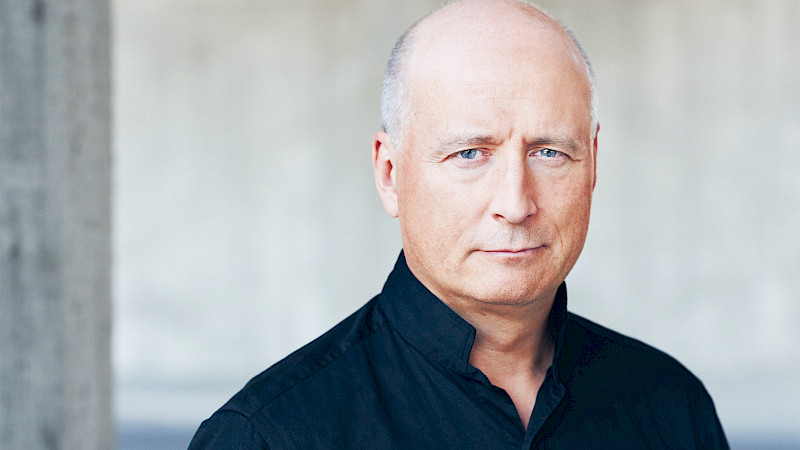
«We Will Meet in Istanbul»
22 nations are represented in the Tonhalle-Orchester Zürich. What does that mean, humanly and musically? Three musicians tell us.
The Tonhalle-Orchester Zürich gathers around 100 people from four continents and 22 nations – does that play a role in your collaboration?
Isaac Duarte: Yes, a positive one! I find this mixture and the exchange among each other wonderful. As a Brazilian, that's what has always fascinated me about Europe; the countries and peoples are so close together here. And the music is an original language: we understand each other, even if we come from different traditions.
Mio Yamamoto: There are cultural and musical differences between us, but I also see that as an advantage, it makes the cooperation interesting. It's not always peaceful, but it works well.
You laugh – what are the reasons for friction?
Mio: It's about musical questions, about crescendo or decrescendo, about vibrato ... I studied in Japan and came directly to Europe for the audition. At that time, Eiko Furusawa was concertmaster of the Tonhalle-Orchester Zürich, and she told me that I had to change a lot if I wanted to get a job. In Japan, for example, we do a faster vibrato compared to the European tradition. Then when I joined the orchestra here, a colleague told me, "We'll meet in Istanbul." I didn't understand what he meant at first. But that's what it's all about: the compromise of meeting somewhere in the middle. I really appreciated being accepted like that, also with so much humour.
Alican Süner: I left Turkey when I was 17 and then lived in Germany for twelve years, so the step to Switzerland wasn't so big for me. I really like the fact that the country itself is so diverse, which we also notice in the orchestra: we have colleagues from German-speaking Switzerland, from French-speaking Switzerland and from Ticino. It's a very exciting mixture here. But we still find a common sound.
How is this overall sound created?
Isaac: Our former principal conductor David Zinman was very important, he shaped many things. Before he came, there were many outstanding musicians in the orchestra. There was the concertmaster Anton Fietz, the principal violist Michel Rouilly and the principal trumpeter Henri Adelbrecht. I had already heard of the bassoonist Manfred Sax in Brazil, then there was Hans Martin Ulbrich, Claude Starck and many others. But the orchestra's self-confidence was pretty battered after a few difficult years; it needed a conductor who could get the maximum out of us.
Mio: With David Zinman, it was always clear how everything had to be. So he laid the foundation for us to be able to play a bit more freely again under Paavo Järvi. Paavo himself is spontaneous, every evening is different; but we can also bring in our own taste. Nevertheless, he keeps everything together.
Alican: I like this mixture of authority and freedom. In Turkish culture there is much more spontaneity than here, there is great musical talent, but a lot is very disorganised.
Isaac: What David Zinman and Paavo Järvi have in common is that they value the orchestra very much. That's important, because in music, too, everything is a question of chemistry.
"I am really convinced that diversity is a good way to a peaceful world."
Isaac Duarte
What is the chemistry like in the orchestra? How do you function among yourselves – are the register groups decisive, or does the origin play a role?
Mio: The register is of course the most important team. But the Japanese colleagues are also important for me. When I talk to them, I move completely in the Japanese world of thought. On the other hand, when I discuss in the register, I switch; then I have a different function, a different perspective. I don't get stuck in the Japanese view.
Alican: I'm the only Turk in the orchestra, I can't talk to anyone in my mother tongue, but that doesn't matter. Intuitively, I already feel a connection to those who come from similar countries. Our concertmaster Klaidi Sahatçi, for example, comes from Albania, and although we speak English with each other, it feels as if we are from the same country. Or my register colleague Syuzanna Vardanyan: she comes from Armenia, and when I make a joke, she understands it immediately. But apart from that, origin doesn't matter, I have good contact with others too.
Isaac: It's about the people, not the origin. By the way, not only in the orchestra: I also get along very well with our orchestra technicians, we have wonderful conversations or sometimes fool around backstage. Or sometimes I come very early in the morning, when they're still cleaning, and I often meet a woman from Santo Domingo, and there's always a big "Buenos dias". That's normal for me. Brazil is a "wish punch", where emigrated Europeans, descendants of African slaves and the indigenous population mix. I am really convinced that diversity is a good way to a peaceful world.
Is the orchestra a positive model in this sense? Even beyond the music?
Isaac: I think so. We don't only talk about music, I also have many political discussions here. In Brazil, the problems are very acute at the moment, and there are also unpleasant developments in other countries.
Mio: Who do you talk to about this?
Isaac: Everyone who is interested! There are many people who are well informed and know a lot about it.
Mio: I mainly talk about the family, about the children, about school. I don't know the Swiss education system, and many others in the orchestra feel the same way. So we exchange information and experiences.
Alican: Yes, the human exchange is important. I was very touched when, after the earthquake in Turkey, many people asked me if everything was all right with my family. The fact that they thought of that is a sign for me of a really good collegiality.
Mio: Many colleagues are also interested in each other's culture, especially the Japanese culture fascinates some in the orchestra. That encourages me, I then feel: I can be here, I don't have to be shy and hide.
Alican: You can really be yourself here. There are people in the orchestra who don't fit into any pigeonhole, who come from completely different backgrounds, and that is accepted. You are who you are.
What are your backgrounds? What are your earliest musical memories?
Alican: In my family we listened to everything except classical music. Folk songs, rock ... When I was seven years old, a choir director came to school. We were 40 children in the class, she chose three for the choir, I was among them. The day after, she called my parents and said I had absolute pitch, I had to take the entrance exam for the conservatoire; that's what we call music school from the beginning to graduation. I didn't even know what that was! But I took the exam, it was about rhythmic tests and ear exercises. After that they gave me a violin. They thought I was small enough for it ... Well, the smallness thing has changed since then, but the violin still fits.
Mio: My father loved classical music. He sang in a choir and had many records, including one with Vivaldi's "Four Seasons". I loved that record! My older sister then started playing the violin when she was four, I was only two and wanted to too. But I had to wait, and I remember how much I longed for my fourth birthday. When I was finally allowed to play the violin, it was really a great joy. Later, I didn't always feel like it.
Isaac: Classical music was not an issue at home. My mother sang very beautifully, when she washed the dishes and so on. And of course in Brazil you hear music on every corner, folk music, dance music ... I then joined a brass band because a colleague thought it was so great. At that time, the flute and the accordion were the only instruments I knew, but a flute was not free, so I started with clarinet, but it was actually too big for me. When I was 15, I switched to the oboe; my first teacher was a saxophonist who played the bassoon.
Mio: A nice mixture, too!
Isaac: Yes, it was really all by chance. But the most formative experience I had was when I was 14, listening to the Recife Symphony Orchestra playing Beethoven's Sixth. Sometimes, when I feel homesick, it all comes back, this wonderful atmosphere, the tropical morning, the light ... I sat in this baroque theatre, completely lost and totally fascinated.
Mio: I also had such a moment, I experienced a concert with Zubin Mehta in Japan, he conducted Bartók's Concerto for Orchestra. The double bass part at the beginning gave me goose bumps. And I knew at that moment that I would emigrate to be able to produce such a sound myself one day.
Is that a difficult moment – when you realise that you have to leave home for your dream job?
Isaac: For me it was a dream. Most Brazilians who love classical music dream of Europe – because it is European music that we play. I actually wanted to go to Germany, but a good friend was in Zurich, so I came here to study and later to join the orchestra. That was my lottery win, I really feel at home here. There was a moment about 20 years ago when the orchestra in São Paulo became more international; I was a little itchy. But my wife grew up in São Paulo, she didn't want to live there anymore, so we stayed. In the meantime I have a Swiss passport, I'm a Wetzikoner.
Alican: I left Turkey at the age of 17 because I no longer had the opportunity to develop musically there. But that was only possible because I had good conditions: I had a good teacher in Turkey. My parents supported me, even though they never attended a classical concert before I played; they never said I'd better become a doctor, a teacher or whatever. And the ratio between the euro and the Turkish lira was 1 to 1.5 back then, so studying abroad was affordable, even though we weren't rich. Today it's 1 to 21!
You have only been in the orchestra since 2021, have your parents been here before?
Alican: No, we haven't managed that yet, the bureaucracy is still pretty big. They've only been to Germany once, too, for my final exams. But they will certainly be able to come here one day.
What do you miss most from your home country?
Mio: The food! It may sound stupid, but food is really important.
Isaac: I understand that very well with Japanese cuisine.
Alican: Hopefully also with Turkish cuisine!
Isaac: I missed my mother very much, she was a wonderful person, a strong personality. But she always told me to stay in Switzerland; I've really been at home here for a long time. Only when I'm tired, it's sometimes as if I smell the sea and feel the humid heat of Recife. What you experience as a child makes a very strong impression.
Mio: In Japan there is a proverb for it: The three-year-old spirit stays until a hundred.
Alican: They say the same thing here, only with different numbers: seven and 77!
Isaac: Is it a coincidence that there are such similar proverbs in Japan and Turkey?
Alican: I once heard that the two languages are not so different, there are grammatical similarities.
Mio: Yes, there are also words that sound similar – maybe it has to do with the Silk Road, with the old trade relations? Either way, the saying is simply true: we are happy here, but the longing remains.
***
Our universe
22 nations are represented in the Tonhalle-Orchester Zürich, of which only two are large: 40 musicians have a Swiss passport (some of them also have a second one), 25 a German one. Four musicians each come from Italy, Poland, Japan and the USA; a maximum of three from all the following countries: Albania, Armenia, Belgium, Brazil, China, France, Great Britain, Israel, Austria, Portugal, Romania, Russia, Slovenia, Spain, Turkey, Venezuela. With the Estonian music director Paavo Järvi, the number of nations represented rises to 23. And in the management, Liechtenstein, the Czech Republic and Pakistan are added.
Translated with DeepL.com







